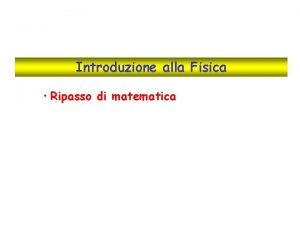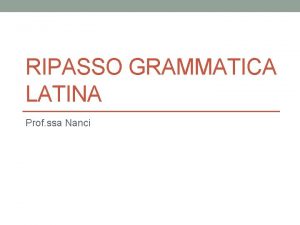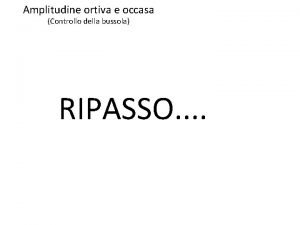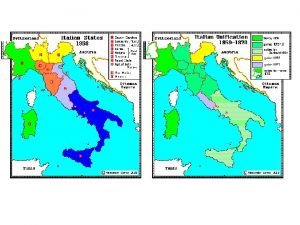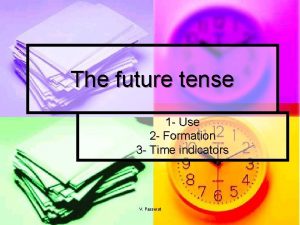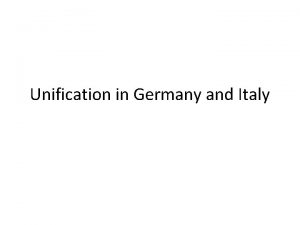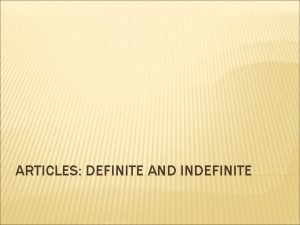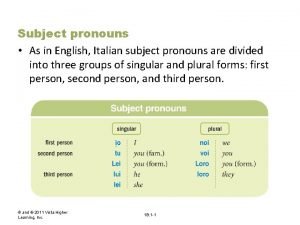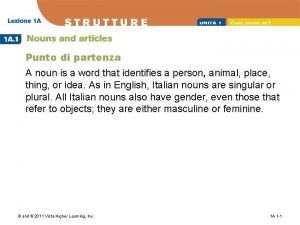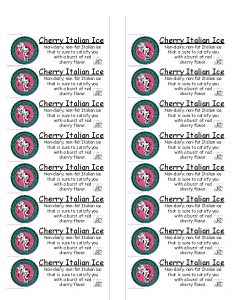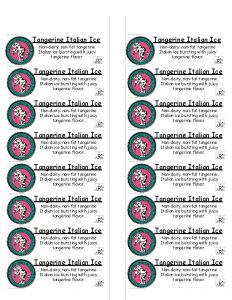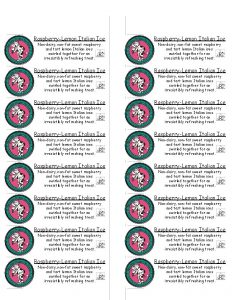Un ripasso dellanno scorso JEOPARDY Italian II Signora


































- Slides: 34

Un ripasso dell’anno scorso JEOPARDY Italian II Signora Sardella

I Pronomi soggetto Singolare 1 a persona io 2 apersona tu (informal) Lei (formal) lui/lei she 3 a persona Plurale I noi we you voi you Loro you he/ loro they

Quale pronome? 1. 2. 3. 4. 5. 6. Your cousin Cecilia Your friends The server Yourself You and your brother Your aunts Write a sentence using each pronoun in your notebook.

Gli articoli determinativi = the Masculine definite article Before x, y, or z or a double consonant with s Before a vowel Feminine Before a single Definite Article consonant Before a vowel Singular Plurale lo gli l’ Singular il gli Plural i la le l’ le

La pratica Ecco la famiglia di Pietro. gli uomini sono tutti alti e bruni, ma le donne sono bionde e piuttosto basse. zii e zie di Pietro sono molti e anche cugini. bambini di Pietro hanno sette e nove anni, bambina e’ molto divertente. parenti di Pietro sono tutti simpatici. Worksheet Esercizi A

Gli articoli indeterminati= a(n) Masculine indefinite article Before x, y, z, or, a double consonant with s Before any other Feminine consonant Indefinite or vowel articles Before a consonant Singular Before a vowel un’ uno un Singular una

Gli articoli indeterminativi • You are at an Italian caffé. Chiami il cameriere e ordini: 1. Coca- cola 2. Scotch 3. Birra 4. Aranciata 5. Cioccolata http: //homes. chass. utoronto. ca/~ngargano/cor si/100/frameset 1. html

Plurals of Nouns If the singular form ends in: The plural ends in: -o -i tavolo -i calendario -a -e studentessa -e -i dottore A consonant No change bar An accented vowel No change città Examples: tavoli calendari studentesse dottori bar città Worksheets on “Nomi, Articoli, e aggetivi” e “Plurali particolari”

Plurals of Nouns Many nouns ending in – co, -go, -ca, -ga add h in the written plural to preserve the sound of the c or g. Esempi: lago laghi tedesco tedeschi amica amiche BUT: amico amici

La Pratica • In groups of three of four: With books closed, quiz each other on plural forms. One person starts by saying a noun. The first person in the group to give the correct plural of that noun gives the next noun.

Gli Aggettivi corrispondono al sostantivo in genere e numero. Se Esempio Singolar Plurale l’aggetti : e vo finisce in: O italiano italiani (maschile ) *nota Abene: aggettivi di nazionalità non sono american (femmini a a e capatalizzati

Aggettivi che finiscono in –co e -go • Aggiungi una “h” nel plurale per mantenere la pronuncia. Esempio simpatico Plurale Abbiamo amiche simpatiche. tedesco Gina e Marco sono • Nota bene: tedeschi. stanco 1 è femminile. Gianni e Franco • Esempio plurale. sono stanchi. • Esempio 2: maschile e femminile si volge al maschile • Esempio 3: è maschile plurale

Why we do this… • Gli aggettivi maschili in go e co hanno il plurale in ghi, chi, quelli femminili singolari in ga e ca hanno il plurale in ghe e che. ca > -che Ga> -ghe Simpatica Larga Simpatiche larghe Co> ci Co> chi Simpàtico stànco Simpàtici stànchi Go> ghi Lungo lunghi

• • uomo stanco -----> gli uomini stanchi un desiderio vago -----> i desideri vaghi Una donna stanca -----> le donne stanche una speranza vaga -----> le speranze vaghe • se la parola è piana (parossitona), con accento sulla penultima sillaba, il plurale sarà in -chi e in –ghi http: //books. google. com/books? id=OMTf. ANh. X 9 g. C&pg=PA 47&lpg=PA 47&dq=why+tedeschi+but+simpatici&source=b l&ots=Si. Jz 2 rnxp 3&sig=Ft. Aq. Ok. ZUFf. DUUb. BQv. Xg. IL 6 NQ 2 M&hl=en&ei=8 R 2 l. TJGBNc. T 38 Aa. Rnj 6 AQ&sa=X&oi=book_result&ct=result&resnum=4&ved=0 CCYQ 6 AE w. Aw#v=onepage&q&f=false

BAGS

Present Tense Endings -are endings -o -i -a -iamo -ate -ano Esempio: parlare- to speak io parlo noi parliamo tu parli voi parlate lui parla loro parlano

Present Tense Endings -are endings • Verbs ending in –care and –gare, add an h to the infinitive stem in the tu and noi forms. cercare- to look for io cerco noi cerchiamo tu cerchi voi cercate lui cerca loro cercano pagare- to pay for io pago noi paghiamo tu paghi voi pagate lui paga loro pagano

Present Tense Endings -are endings Verbs ending in –iare, like cominciare and mangiare drop the i from the infinitive in the tu and noi forms. Esempio: Mangiare- to eat io mangio tu mangi lui mangia noi mangiamo voi mangiate loro mangiano

Common Regular –are verbs abitare- to live arrivare- to arrive ascoltare- to listen (to) aspettare- to wait cantare- to sing chiamare- to call cominciare- to begin comprare- to buy desiderare- to want/wish mandare- to send pensare (di)- to think of dimenticare- to forget entrare- to enter frequentare- to attend giocare- to play guidare- to drive imparare- to learn incontrare- to meet insegnare- to teach lavorare- to work passare- to pass portare- to bring

La Pratica • In pairs ask the following questions, changing the subjects appropriately using the noi form. 1. Cercate un ristorante? (no, un bar) 2. Cosa comprate oggi? (riviste italiene) 3. Studiate insieme più tardi? (no, domani) 4. Tornate a casa addesso? (no, più tardi) 5. Pensate di fare due passi adesso? (no, di prendere un gelato) 6. Cosa guardate all televisione stasera? (un film)

Present Tense -ire endings - o - i - e -iamo - ite - ono Esempio: dormire – to sleep io dormo noi dormiamo tu dormi voi dormite Lui dorme loro dormono capire- to understand io capisco noi capiamo tu capisci voi capite lui capisce loro capiscono

Verbs like Dormire aprire- to open offrire- to offer partire- to leave, depart seguire- to follow, to take (courses) sentire- to hear, to feel servire- to serve, to be useful soffrire- to suffer Verbs like Capire *shoe verbs finire- to finish ubbidire- to obey preferire- to prefer pulire- to clean restituire- to give back riferire- to report, relate spedire- to send suggerire- to suggest

Verbi irregolari -ire Venire- to come io vengo tu vieni lui viene noi veniamo voi venite loro vengono

Present Tense -ere endings -o - i - e - iamo -ete -ono Esempio: prendere- to take io prendo noi prendiamo tu prendi voi prendete lui prende loro prendono

-ERE VERBI Assistere- to attend vedere- to see Chiedere- to ask for vendere- to sell Chiudere- to close Conoscere- to know (a person or a place), to meet Credere- to believe scrivere- to write Leggere- to read rispondere- to answer Mettere- to put, place ricevere- to receive

Irregular Present Tense Essere- to be Avere- to have io sono tu sei lui/ lei è Lei è io ho noi siamo voi siete loro sono Loro sono noi abbiamo tu hai voi avete lui/ lei ha loro hanno Lei ha Loro hanno

Irregular Present Tense Dare do diamo dai date dà danno Fare faccio fai fa Stare facciamo stiamo fate stai state fanno stanno

I Numeri • Let’s quickly review our numbers in Italian! La Pratica: Read these numbers and then give the numbers that precede and follow each one. In pairs, compete against each other to see who can write the correct numbers first. 1. ) 2. ) 3. ) 47 53 34 72 5. ) 6. ) 7. ) 8. ) 29 67 98 81 9. ) 77 10. ) 365 11. ) 1. 000 12. ) 950

Le Ore

Le ore Che ora è? and che ore sono? are used interchangeably. * Italian digital clocks run on a 24 hour system. di mattina in the morning del pomeriggio in the afternoon di sera in the evening

Le ore • La Pratica: In pairs ask another student at what time he/she does the following things. Then reverse the roles. Esempio: A che ora…. ? Alle… 1. ) mangi la sera 4. ) sei a casa oggi pomeriggio 2. ) studi 5. ) vai a letto 3. ) hai lezione d’inglese

Il Calendario • Ripassiamo i giorni della settimana, I mesi dell’anno, come si scrive le date, e le stagioni.

I Pronomi Possessivi

Il Passato Prossimo
 Castellammare valpolicella ripasso superiore
Castellammare valpolicella ripasso superiore Ripasso letteratura italiana
Ripasso letteratura italiana Proporzionalità inversa
Proporzionalità inversa Grammatica latina ripasso
Grammatica latina ripasso Ripasso disequazioni
Ripasso disequazioni Ripasso promessi sposi
Ripasso promessi sposi Formula amplitudine
Formula amplitudine Italian risorgimento timeline
Italian risorgimento timeline Renaissance literature writers
Renaissance literature writers Italian school system
Italian school system Italian immigration to scotland
Italian immigration to scotland Future tense
Future tense Scratched drawing italian
Scratched drawing italian Central eastern italy
Central eastern italy Italian nobleman crossword
Italian nobleman crossword Military jet hits cable car
Military jet hits cable car German and italian unification compare and contrast
German and italian unification compare and contrast Italian definite articles chart
Italian definite articles chart American football in italy
American football in italy Anti italian cartoons
Anti italian cartoons What does humanism mean in the renaissance
What does humanism mean in the renaissance Italian composer or pasta
Italian composer or pasta Famous italian designers
Famous italian designers Lafeasta
Lafeasta Italian for rebirth
Italian for rebirth Example of ode poetry
Example of ode poetry Anne bollyn
Anne bollyn Italy birthplace of the renaissance
Italy birthplace of the renaissance Italija
Italija Subject pronoun italian
Subject pronoun italian Means little song in italian
Means little song in italian Italian renaissance vs northern renaissance
Italian renaissance vs northern renaissance Lezione masculine or feminine
Lezione masculine or feminine Italian school system
Italian school system Where is the creation of adam located
Where is the creation of adam located


